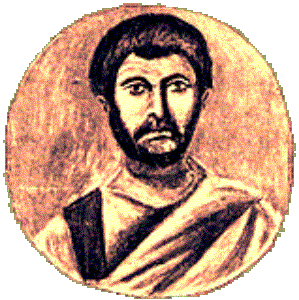„Den Starken hilft das Glück.“
Phormio, 203, Akt I / Geta
Original lat.: "Fortes fortuna adiuvat."
Grundlage des Sprichworts "Audaces fortuna adiuvat"
Publius Terentius Afer, auf Deutsch Terenz , war einer der berühmtesten Komödiendichter der römischen Antike. Er war neben Plautus der bedeutendste römische Dichter der Archaik und stand dem aristokratischen Scipionenkreis nahe. Von Terenz sind insgesamt sechs Komödien erhalten, die zwischen 166 und 160 v. Chr. aufgeführt wurden. Wikipedia

„Den Starken hilft das Glück.“
Phormio, 203, Akt I / Geta
Original lat.: "Fortes fortuna adiuvat."
Grundlage des Sprichworts "Audaces fortuna adiuvat"
„Ich bin ein Mensch und meine, daß mir nichts fremd ist, was Menschen betrifft.“
Heauton Timorumenos, 77, Akt I.i / Chremes
Original lat.: "Homo sum, humani nil a me alienum puto."
Das Zitat geht angeblich zurück auf Menandros, auch bei Cicero und Seneca d.J.
„Das höchste Recht ist oft das höchste Übel.“
Heauton Timorumenos, 796, Akt IV.v / Syrus
Original lat.: "ius summum saepe summast(summa est) malitia."
bekannt geworden durch Cicero in der Form "Summum ius, summa iniuria"
„Das ist ein Vorhaben von Verrückten nicht von Liebenden.“
Andria, 218, Akt I / Davos
Original lat.: "Inceptiost(inceptio est) amentium, haud amantium."
Grundlage des Sprichworts "Amantes amentes"
„Der Streit der Liebenden ist die Erneuerung der Liebe.“
Andria 555, Übersetzung Wikiquote, oft fälschlich dem Publilius Syrus zugeschrieben
Original lat.: "Amantium irae amoris integratio est."
„Eine Tat kann man nicht ungeschehen machen.“
Phormio 5, 8, 45
Original lat.: "Factum fieri infectum non potest."
Adelphoe, 98-99, Akt I,2 / Micio Senex
Original lat.: "Homine imperito numquam quicquam iniustius est, qui nisi quod ipse fecit nil rectum putat." (auch als Inschrift zur Skulptur des Terenz im Ulmer Muenster
„Heutzutage gibt es Belohnungen für die, die Gutes schlecht machen.“
Phormio, 771, Akt V / Demipho
Original lat.: "Is nunc praemiumst(praemium est) qui recta prava faciunt."
gemäß Ausonius, Ludus septem sapientum (Prolog)
Original griech.: "Μηδὲν ἄγαν"; spr. "Mēden agān")
(lat.: "Ne quid nimis."
Zugeschrieben
„Wieviele Leute, soviele Meinungen.“
Phormio, 454, Akt II / Hegio
Original lat.: "quot homines tot sententiae."
“So many men, so many opinions: to each his own way.”
Quot homines tot sententiae: suus cuique mos.
Act II, scene 4, line 14 (454).
Variant translations:
There are as many opinions as there are people: each has his own view.
There are as many opinions as there are people: each has his own correct way.
There are as many opinions as there are people: everyone has their own way of doing things.
Phormio
“It is a maxim of old that among themselves all things are common to friends.”
Act V, scene 3, line 18 (803).
Adelphoe (The Brothers)
“I only wish I may see your head stroked down with a slipper.”
Act V, scene 7, 4, line 1028.
Eunuchus
“What now if the sky were to fall?”
Act IV, scene 3, line 41 (719).
Heauton Timorumenos (The Self-Tormentor)
“Moderation in all things.”
Ne quid nimis.
Not anything in excess, a translation from the Greek μηδὲν ἄγαν. "Nothing in excess" as inscribed on the Temple of Apollo at Delphi.
Quelle: Andria (The Lady of Andros), Line 61.
“Look you, I am the most concerned in my own interests.”
Act IV, scene 1, line 12 (636).
Andria (The Lady of Andros)
“Many a time,… from a bad beginning great friendships have sprung up.”
Act V, scene 2, 34, line 873.
Eunuchus
“Some might, but not you.”
Aliis si licet, tibi non licet.
Act IV, scene 5, line 49 (797).
Variant translations:
Though others were at liberty, you are not at liberty.
Even though it is permitted for others, it isn't permitted for you.
Heauton Timorumenos (The Self-Tormentor)
“Hence these tears.”
Hinc illae lacrimae.
Variant translation: Hence all those tears shed.
Quelle: Andria (The Lady of Andros), Line 126.
“Time removes distress.”
Diem adimere aegritudinem hominibus.
Act III, scene 1, line 12 (421).
Variant translations:
Time heal all wounds.
Time assuages sorrow.
Heauton Timorumenos (The Self-Tormentor)